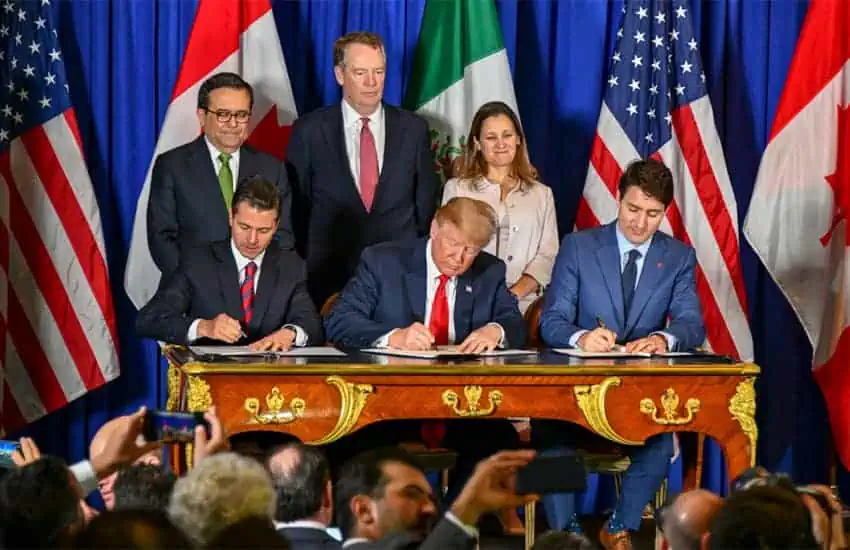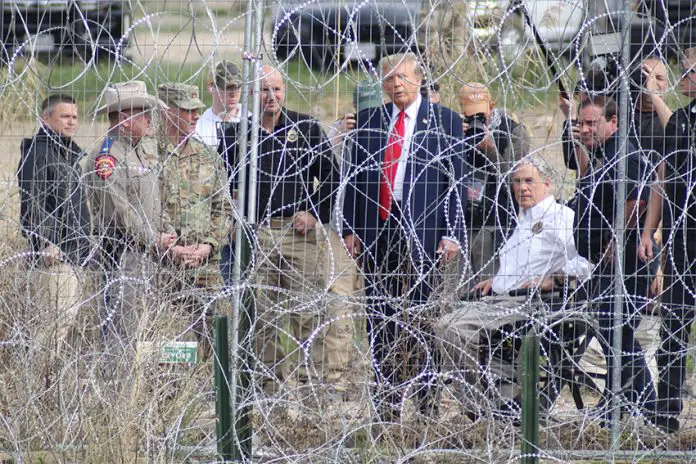Republican Party presidential candidate Donald Trump on Monday pledged to “immediately” impose a 25% tariff on all Mexican exports to the United States if the government of Mexico doesn’t stop what he called an “onslaught” of criminals and drugs to the U.S.
To act on his threat, the former U.S. president will, of course, have to beat Democratic Party candidate and Vice President Kamala Harris in Tuesday’s election.
“We’re being invaded by Mexico,” Trump said during a rally in Raleigh, the capital of the swing state of North Carolina.
“But now we have a new president of Mexico. Supposed to [be] a very nice woman, they say. I haven’t met her. And I’m going to inform her on day one or sooner that if they don’t stop this onslaught of criminals and drugs coming into our country, I’m going to immediately impose a 25% tariff on everything they send into the United States of America,” he said.
“… You’re the first ones I’ve told it to. Congratulations North Carolina. And it’s only got a 100% chance of working because if that doesn’t work I’ll make it 50 [percent],” Trump said.
“And if that doesn’t work I’ll make it 75 for the tough guys, then I’ll make it 100,” he said.
Election Eve sunrise in Raleigh. Trump rally today, his third day in a row in North Carolina. pic.twitter.com/01xMTIKmoK
— Dawn B. Vaughan (@dawnbvaughan) November 4, 2024
Trump’s latest tariff threat comes after he made repeated promises to slap hefty duties on vehicles made in Mexico.
Tariffs on Mexican exports to the U.S. would contravene provisions in the USMCA, but Trump appears to have no qualms about violating the three-way trade pact, and has pledged to renegotiate it if he returns to the White House.
While president in 2019, he threatened to impose a 5% tariff on all goods from Mexico if the Mexican government didn’t do more to stem migration to the United States. The two countries subsequently reached a deal that averted the blanket tariffs and resulted in Mexico deploying federal security force members to both its southern and northern border.
During this presidential campaign, Trump has suggested he would impose 20% tariffs on imports from all of the United States’ trade partners, a plan that economists say would significantly increase prices for U.S. consumers.
According to The Washington Post, tariffs on Mexico’s exports to the United States “would amount to a multitrillion-dollar tax on purchasers of Mexican-made goods.”
Mexico is the largest exporter of goods to the United States, passing China to seize the top position in 2023.
The Post reported that “even a 25% tariff” on Mexican goods would “undermine” the USMCA, which Trump signed, and “translate into a roughly $100 billion annual tax — and more than $1 trillion over the next decade.”

Such a tariff would “invite retaliation from Mexico’s government,” the newspaper said.
Trump’s ‘onslaught of criminals and drugs’ claim
While the number of migrants arriving at the United States southern border hit record highs during Joe Biden’s presidency, encounters between migrants and U.S. authorities have declined significantly since Biden enacted a new border policy in June.
In September, there were 53,900 encounters between U.S. authorities and migrants between ports of entry on the Mexico-U.S. border, a 75% annual decrease, according to Customs and Border Protection.
Trump has spoken about various crimes committed or allegedly committed by migrants to support his claim that the United States is being inundated with criminals.
However, studies show that immigrants are not more likely to engage in criminality than other people, Reuters reported earlier this year.
“A range of studies by academics and think tanks have shown that immigrants do not commit crime at a higher rate than native-born Americans,” the news agency said in July.

“A more limited universe of studies specifically examine criminality among immigrants in the U.S. illegally but also find that they do not commit crimes at a higher rate,” Reuters said.
With regard to drugs, it is common knowledge that huge amounts of narcotics enter the United States from Mexico, many of which are manufactured here by Mexican cartels. Among the illicit substances shipped north from Mexico are cocaine, heroin, methamphetamine and increasingly fentanyl, a powerful synthetic opioid largely responsible for the overdose crisis in the United States.
Still, in response to a tariff threat from Trump, the administration led by President Claudia Sheinbaum could conceivably argue that Mexico is already making significant efforts to stop illegal drugs and migrants crossing into the United States.
Federal officials made that argument during the previous term of government, with former foreign affairs minister and current Economy Minister Marcelo Ebrard describing Mexico as “the United States’ main ally in the fight against fentanyl.”
Indeed, the Mexican government seized a record amount of fentanyl during former president Andrés Manuel López Obrador’s six-year term, an achievement acknowledged by U.S. Secretary of State Antony Blinken earlier this year.
Furthermore, undocumented migrants traveling through Mexico are often detained and subsequently deported or transferred back to the south of the country, even as the government defends people’s right to seek asylum.
With reports from The Hill and The Washington Post
